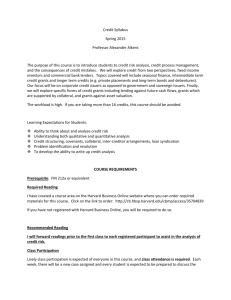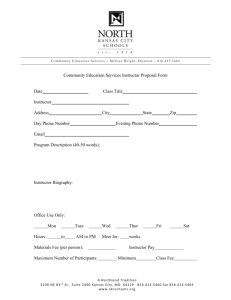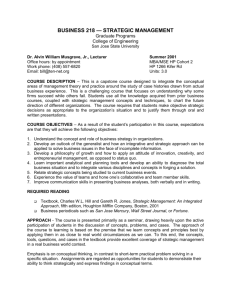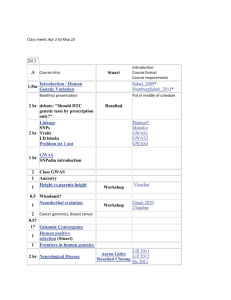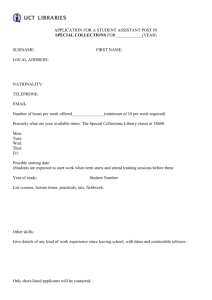POLS Y224 - School of Liberal Arts
advertisement
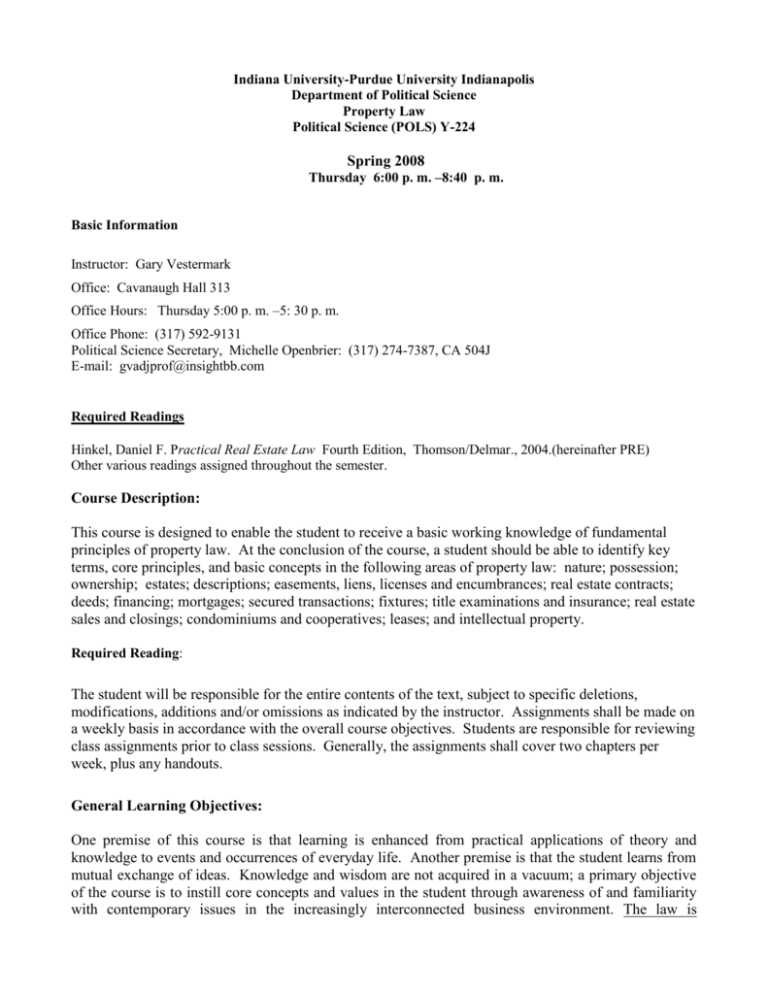
Indiana University-Purdue University Indianapolis Department of Political Science Property Law Political Science (POLS) Y-224 Spring 2008 Thursday 6:00 p. m. –8:40 p. m. Basic Information Instructor: Gary Vestermark Office: Cavanaugh Hall 313 Office Hours: Thursday 5:00 p. m. –5: 30 p. m. Office Phone: (317) 592-9131 Political Science Secretary, Michelle Openbrier: (317) 274-7387, CA 504J E-mail: gvadjprof@insightbb.com Required Readings Hinkel, Daniel F. Practical Real Estate Law Fourth Edition, Thomson/Delmar., 2004.(hereinafter PRE) Other various readings assigned throughout the semester. Course Description: This course is designed to enable the student to receive a basic working knowledge of fundamental principles of property law. At the conclusion of the course, a student should be able to identify key terms, core principles, and basic concepts in the following areas of property law: nature; possession; ownership; estates; descriptions; easements, liens, licenses and encumbrances; real estate contracts; deeds; financing; mortgages; secured transactions; fixtures; title examinations and insurance; real estate sales and closings; condominiums and cooperatives; leases; and intellectual property. Required Reading: The student will be responsible for the entire contents of the text, subject to specific deletions, modifications, additions and/or omissions as indicated by the instructor. Assignments shall be made on a weekly basis in accordance with the overall course objectives. Students are responsible for reviewing class assignments prior to class sessions. Generally, the assignments shall cover two chapters per week, plus any handouts. General Learning Objectives: One premise of this course is that learning is enhanced from practical applications of theory and knowledge to events and occurrences of everyday life. Another premise is that the student learns from mutual exchange of ideas. Knowledge and wisdom are not acquired in a vacuum; a primary objective of the course is to instill core concepts and values in the student through awareness of and familiarity with contemporary issues in the increasingly interconnected business environment. The law is concerned with predictability and accountability in a society governed by mutual obligations. These themes shall be repeatedly emphasized in the course through analyzing legal relationships. Underlying this process, additional goals shall include an awareness of ethics and morality underlying the law; formulation of analytical tools necessary in identifying and resolving legal issues; and the responsibility of the student as a member of society to appreciate, understand and respect the institutions and system of laws upon which our nation was founded. Since this is an introductory law course it is very likely many students may feel unsure or uncomfortable as to course content and structure. In that vein, it is strongly encouraged for students to ask questions. There is no such thing as a stupid question since any question may generate fruitful, spin-off thought processes and dialogs. If there is any difficulty in comprehension and retention as to concepts, issues and institutions the student is strongly encouraged to initiate consultation to clarify course structure, organization and content by arranging for a mutually convenient appointment with the instructor in 313, Cavanaugh Hall. Specific Learning Objectives: Real Property – acquisition, ownership and transfer Personal Property – capture, possession, ownership, fixtures and bailments Ownership – types and creation Land Description – surveys, maps Eminent Domain – condemnation, just compensation, public purpose Claims and Encumbrances – easements, liens, licenses and restrictions Real Estate Contracts and Agency Law – elements, requirements and regulations Real Estate Contracts – elements; form and content; preparation and review Deeds - nature, elements, form, warranty, execution and delivery Real Estate Financing – mortgages, trusts, insurance, bonding Titles - search, examinations, exclusions, exceptions and insurance Real Estate Closings – escrows, government regulation, transfer of title and risk of loss Condominiums and Cooperatives – sharing of ownership and possession Intellectual Property – patents, trademark, trade names, copyrights and trade secrets Expectations of Students: Attendance, Deportment and Participation Attendance until dismissal is expected at all class sessions. The instructor will maintain strict attendance records. The operative assumption is that all students as adults understand the responsibility and necessity of attending classes. This is a policy of the Department of Political Science. If the student elects not to attend, the student bears sole responsibility for mastering the required material, which may not necessarily be limited solely to what may be in the text. In course lectures, textual material may be amplified, modified or clarified in the judgment of the instructor. The student “assumes the risk” of not attending class insofar as grade evaluation will be negatively impacted by irregular attendance. The student has a right to be treated fairly, impartially and accurately. Disabled students shall be respected and accommodated. If there is difficulty in grasping materials and examinations every effort shall be made to allow for separate counseling and assistance according to the policy of the university. However, ultimately the student must be responsible for the necessary effort and dedication in mastering class materials. Disruptive conduct will not be tolerated, which includes without limitation, reading in class of any material except when reference is necessary to class notes or the assigned readings; enabling any electronic device in class; chatting with fellow students or any other conduct which, in the exclusive opinion of the instructor, improperly interferes with the learning environment. Although such disruptive conduct is deemed rude to the instructor more importantly it tends to distract other students from their primary objective of learning in class. Expectations of Students: Overall Evaluation Structure, Grades and Examinations: There will be quizzes; a Real Estate Sales Transaction(REST); a midterm examination; and a final comprehensive examination. Suggested topics, form and structure for the REST will be detailed early in the course. Examinations may be a combination of both short answer and essay, portions of which may be takehome and open book. During the course of the semester the student may be given short answer assignments designed to enhance retention of material and prepare the student for formal examinations. Make-up examinations may be allowed under extenuating circumstances, determined on an individual basis as deemed necessary and appropriate based upon mutual good faith efforts and fairness to all students. The instructor reserves the right to make adjustments and amendments regarding assignments and scheduling. The final course grade will be a composite of the quizzes, class attendance and participation (20%) Real Estate Sales Transaction (20%); midterm examination (20%); and the final comprehensive examination (40%). Class attendance and participation are a fundamental component of the final evaluation of the student. The instructor believes that an integral part of the learning process includes discussion and interchange of ideas. Untimely preparation and inadequate contribution of work will result in a reduction of grade; academic cheating/plagiarism will result in automatic course failure. Course grades are as follows: A - 91 - 100; B - 81 - 90; C - 71 - 80; D - 65 - 70; F - below 65. Tentative Class Schedule The following is a tentative schedule. The schedule is subject to change by the instructor to accommodate and facilitate particular needs of the class and the requirements of the department. Date Topic Assignment Thur. 1/10 Course Introduction; Introduction – Law of Real Property PRE Ch. 1 Thur. 1/17 Introduction/Ownership PRE Ch 1 & 2 Thur. 1/24 Ownership/Land Description PRE Ch. 2 & 3 Thur. 1/31 Deeds/Title Examinations PRE Ch. 8 & 12 Thur. 2/7 Contracts PRE Ch. 6 Thur. 2/14 Real Estate Contracts PRE Ch. 7 Thur. 2/21 Financing/Legal Aspects of Financing PRE Ch. 9 & 10 Thur. 2/28 Mortgage Forms PRE Ch. 11 Midterm Examination Thur. 3/6 Title Insurance PRE Ch. 13 Thur. 3/13 Spring Break N/A Thur. 3/20 Government Regulation of Closing/Real Estate Closing PRE Ch. 15 & 14 Thur. 3/27 Public Regulation/Encumbrances/Closing Forms PRE Ch. 4 & 16 Thur. 4/3 Easements and Licenses PRE Ch. 5 Thur. 4/10 Leases PRE Ch. 18 Thur. 4/17 Condominiums/Cooperatives and Intellectual Property PRE Ch.17 Thur. 4/24 Discussion and Review/REST Project Due N/A Thur. 5/1 Final Examination N/A

